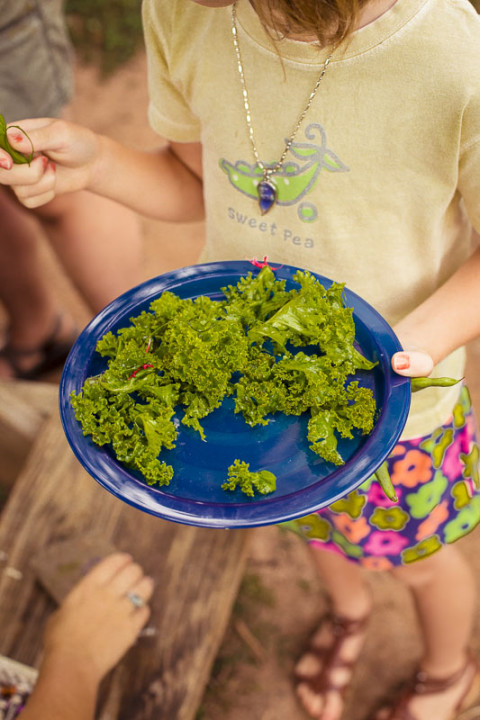Think back to your elementary school math class. For many of us, one of the things we struggled with the most was fractions. You may have tried memorization or repetition — scratching numbers onto a chalkboard over and over. But did you ever think to cut up a fruit and look at how the pieces fit together?
Incorporating garden-based education with an emphasis on healthy eating into the regular curriculum is the goal of two in-school programs run by FEAST. An extension of Slow Food Asheville, FEAST began as monthly cooking and healthy eating classes. Now the effort has expanded to support faculty positions in two elementary schools where a FEAST Garden and Cooking Coordinator will work with teachers to bring the schools’ gardens into the classroom.
“Our FEAST teachers will go and meet with the school staff and say, ‘What are you working on?’” explains Kate Justen, FEAST executive director. “For example, if a class is working on fractions, then the garden lesson is focused on fractions, either through recipes or giving the class pieces of a fruit. So if one student has half of an orange and another has a fourth, they can put those together and see how they combine as pieces of the whole.”
FEAST first began its youth programs with cooking classes at Asheville Middle School and I Have a Dream, an after-school program for children from low-income neighborhoods. But last year, FEAST attained funding that allowed an AmeriCorps volunteer at Vance Elementary to stay on as a part-time faculty member, and this school year an additional position will be created at Francine Delaney New School for Children. Both teachers will lead lessons that emphasize nutrition and ensure students have regular interactions with the garden and the food it produces.
“A lot of the schools have AmeriCorps, which is a great program, but it changes every year,” Justen says. “When an AmeriCorps volunteer begins or runs a school garden, he or she is there for one year, maybe two, and then they leave and someone new comes.”
Justen adds that the turnover can be confusing for young students, and makes it more difficult for them to trust a new instructor. “If I say, ‘Eat this because it’s healthy,’ and they don’t know me, they’re going to say, ‘Who are you and why should I do what you say?’” Justen explains. “But if they know me and they see me all the time, they can trust that I’m telling them the truth and they’re more likely to eat these foods.”
Both of the FEAST elementary school positions are funded through grants, business sponsorships and private donations. The program will also receive additional donations from Mother Earth Produce to help supplement the lessons. The Vance Elementary position now allows instructor Jordan Diamond to work 32 hours a week in the school. Francine Delaney will see Abby Walker, formerly an assistant teacher at the school, leading a weekly program and adapting her curriculum for each grade level.
“It’s something I’ve already seen in schools — teachers are so busy that, even if they want to use the garden in their lessons, it’s too difficult when they’re supposed to teach all this other stuff,” Walker says. “The students aren’t tested on gardening and healthy foods.
“Even if it’s right outside the classroom, often the garden is the last thing teachers are able to squeeze in,” Walker adds. “But having someone there who is actually doing that, once a week or even once every two weeks, is a benefit to the kids and the teachers.”
Walker and Justen say their hope is that the FEAST program will have a positive impact on the nutrition of the students, both in the classroom and at home.
“[At Frances Delaney] we’re an almost 50 percent low-income school, and a lot of the food the kids eat for lunch is very sugary,” Walker says. “My personal goal is to increase healthier foods in the school and even have things from the garden that the kids can buy for lunch or that we include in free lunches.”
“I have parents telling me, ‘My child made me buy this vegetable at the grocery store,’” adds Justen. “So sometimes it’s the case that [the program] is changing nutrition for the whole family. The adults would never have eaten these foods but they are now because the kids want to. We consider that a great success.”
Justen says FEAST hopes to find funds to create a faculty position for the current AmeriCorps volunteer at Hall Fletcher Elementary and expand some FEAST services to W.W. Estes Elementary. She adds that volunteers are always needed to help maintain the school gardens during monthly workdays or to assist with in-class activities.
FEAST will hold its annual fundraising event, Feasting for FEAST, at The Pillar on Thursday, Sept. 4. The event features food from local restaurants, wine from Biltmore and a beer brewed specifically for the event by Oyster House Brewing Company. Tickets are $45 or $35 advance. For more information visit their website.






Before you comment
The comments section is here to provide a platform for civil dialogue on the issues we face together as a local community. Xpress is committed to offering this platform for all voices, but when the tone of the discussion gets nasty or strays off topic, we believe many people choose not to participate. Xpress editors are determined to moderate comments to ensure a constructive interchange is maintained. All comments judged not to be in keeping with the spirit of civil discourse will be removed and repeat violators will be banned. See here for our terms of service. Thank you for being part of this effort to promote respectful discussion.